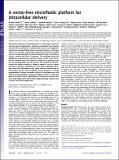A vector-free microfluidic platform for intracellular delivery
Author(s)
Sharei, Armon Reza; Zoldan, Janeta; Sim, Woo Young; Cho, Nahyun; Jackson, Emily L.; Mao, Shirley; Schneider, Sabine; Kim, Kwang-Soo; Han, Min-Joon; Lytton-Jean, Abigail K. R.; Basto, Pamela Antonia; Jhunjhunwala, Siddharth; Heller, Daniel A.; Kang, Jeon Woong; Hartoularos, George C.; Anderson, Daniel Griffith; Langer, Robert; Jensen, Klavs F.; Adamo, Andrea, 1975-; Lee, Jungmin, Ph. D. Massachusetts Institute of Technology; ... Show more Show less
DownloadShareia-2013-A vector-free microfluidic platform for intracellular delivery.pdf (914.7Kb)
PUBLISHER_POLICY
Publisher Policy
Article is made available in accordance with the publisher's policy and may be subject to US copyright law. Please refer to the publisher's site for terms of use.
Terms of use
Metadata
Show full item recordAbstract
Intracellular delivery of macromolecules is a challenge in research and therapeutic applications. Existing vector-based and physical methods have limitations, including their reliance on exogenous materials or electrical fields, which can lead to toxicity or off-target effects. We describe a microfluidic approach to delivery in which cells are mechanically deformed as they pass through a constriction 30–80% smaller than the cell diameter. The resulting controlled application of compression and shear forces results in the formation of transient holes that enable the diffusion of material from the surrounding buffer into the cytosol. The method has demonstrated the ability to deliver a range of material, such as carbon nanotubes, proteins, and siRNA, to 11 cell types, including embryonic stem cells and immune cells. When used for the delivery of transcription factors, the microfluidic devices produced a 10-fold improvement in colony formation relative to electroporation and cell-penetrating peptides. Indeed, its ability to deliver structurally diverse materials and its applicability to difficult-to-transfect primary cells indicate that this method could potentially enable many research and clinical applications.
Date issued
2013-01Department
Harvard University--MIT Division of Health Sciences and Technology; Massachusetts Institute of Technology. Department of Biology; Massachusetts Institute of Technology. Department of Chemical Engineering; Massachusetts Institute of Technology. Department of Chemistry; Massachusetts Institute of Technology. Department of Mechanical Engineering; Massachusetts Institute of Technology. Laser Biomedical Research Center; Massachusetts Institute of Technology. Spectroscopy Laboratory; Koch Institute for Integrative Cancer Research at MITJournal
Proceedings of the National Academy of Sciences
Publisher
National Academy of Sciences (U.S.)
Citation
Sharei, A., J. Zoldan, A. Adamo, W. Y. Sim, N. Cho, E. Jackson, S. Mao, et al. “A vector-free microfluidic platform for intracellular delivery.” Proceedings of the National Academy of Sciences 110, no. 6 (February 5, 2013): 2082-2087.
Version: Final published version
ISSN
0027-8424
1091-6490